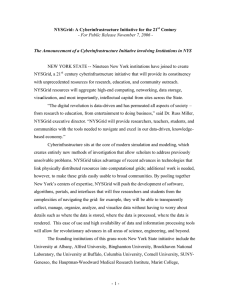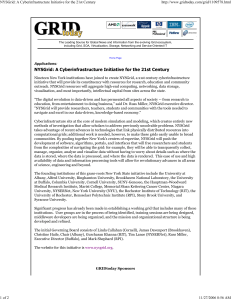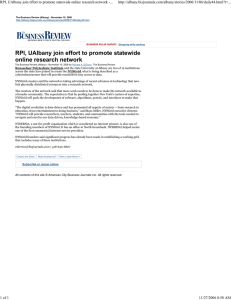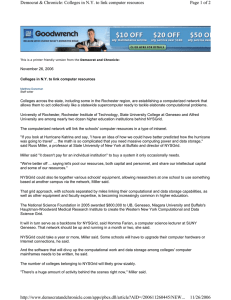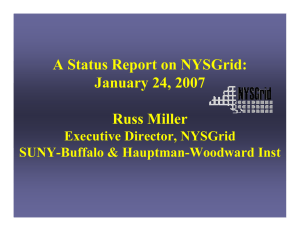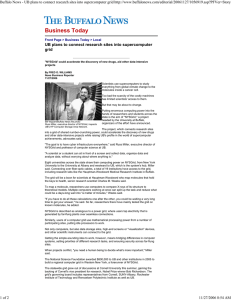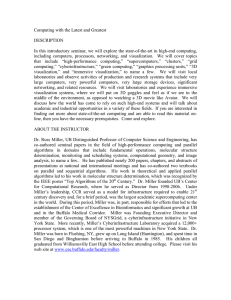NYSGrid: A Cyberinfrastructure Initiative for the 21st Century Supercomputing Online
advertisement
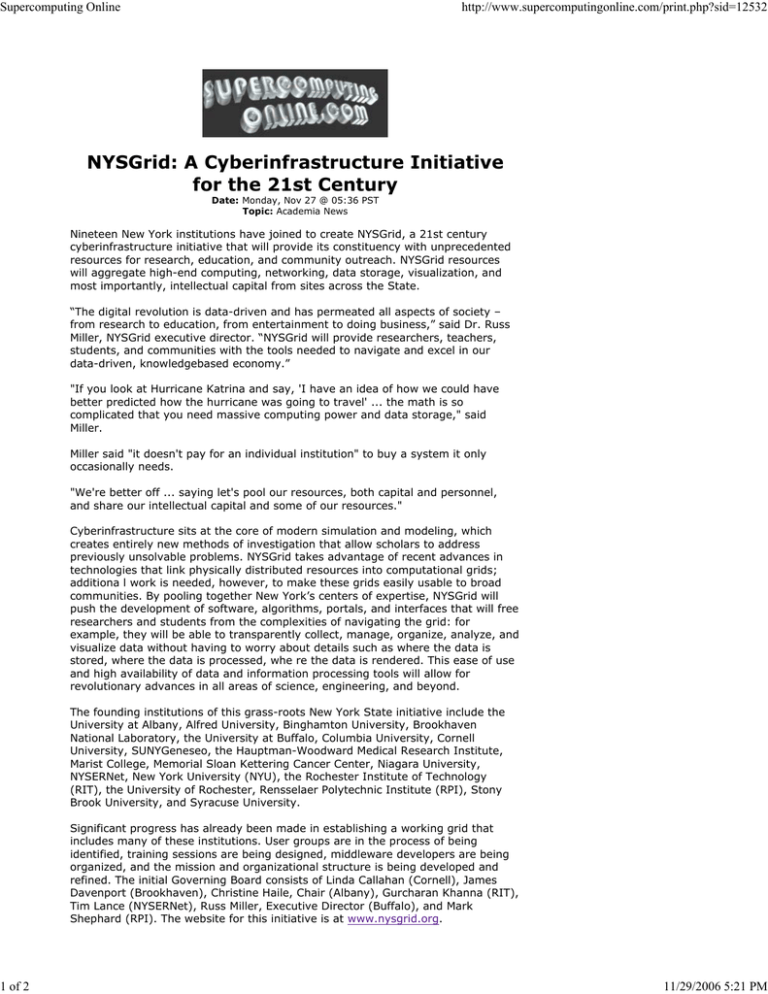
Supercomputing Online 1 of 2 http://www.supercomputingonline.com/print.php?sid=12532 NYSGrid: A Cyberinfrastructure Initiative for the 21st Century Date: Monday, Nov 27 @ 05:36 PST Topic: Academia News Nineteen New York institutions have joined to create NYSGrid, a 21st century cyberinfrastructure initiative that will provide its constituency with unprecedented resources for research, education, and community outreach. NYSGrid resources will aggregate high-end computing, networking, data storage, visualization, and most importantly, intellectual capital from sites across the State. “The digital revolution is data-driven and has permeated all aspects of society – from research to education, from entertainment to doing business,” said Dr. Russ Miller, NYSGrid executive director. “NYSGrid will provide researchers, teachers, students, and communities with the tools needed to navigate and excel in our data-driven, knowledgebased economy.” "If you look at Hurricane Katrina and say, 'I have an idea of how we could have better predicted how the hurricane was going to travel' ... the math is so complicated that you need massive computing power and data storage," said Miller. Miller said "it doesn't pay for an individual institution" to buy a system it only occasionally needs. "We're better off ... saying let's pool our resources, both capital and personnel, and share our intellectual capital and some of our resources." Cyberinfrastructure sits at the core of modern simulation and modeling, which creates entirely new methods of investigation that allow scholars to address previously unsolvable problems. NYSGrid takes advantage of recent advances in technologies that link physically distributed resources into computational grids; additiona l work is needed, however, to make these grids easily usable to broad communities. By pooling together New York’s centers of expertise, NYSGrid will push the development of software, algorithms, portals, and interfaces that will free researchers and students from the complexities of navigating the grid: for example, they will be able to transparently collect, manage, organize, analyze, and visualize data without having to worry about details such as where the data is stored, where the data is processed, whe re the data is rendered. This ease of use and high availability of data and information processing tools will allow for revolutionary advances in all areas of science, engineering, and beyond. The founding institutions of this grass-roots New York State initiative include the University at Albany, Alfred University, Binghamton University, Brookhaven National Laboratory, the University at Buffalo, Columbia University, Cornell University, SUNYGeneseo, the Hauptman-Woodward Medical Research Institute, Marist College, Memorial Sloan Kettering Cancer Center, Niagara University, NYSERNet, New York University (NYU), the Rochester Institute of Technology (RIT), the University of Rochester, Rensselaer Polytechnic Institute (RPI), Stony Brook University, and Syracuse University. Significant progress has already been made in establishing a working grid that includes many of these institutions. User groups are in the process of being identified, training sessions are being designed, middleware developers are being organized, and the mission and organizational structure is being developed and refined. The initial Governing Board consists of Linda Callahan (Cornell), James Davenport (Brookhaven), Christine Haile, Chair (Albany), Gurcharan Khanna (RIT), Tim Lance (NYSERNet), Russ Miller, Executive Director (Buffalo), and Mark Shephard (RPI). The website for this initiative is at www.nysgrid.org. 11/29/2006 5:21 PM Supercomputing Online 2 of 2 http://www.supercomputingonline.com/print.php?sid=12532 The number of colleges belonging to NYSGrid will grow sizably. This article comes from Supercomputing Online http://www.supercomputingonline.com The URL for this story is: http://www.supercomputingonline.com/article.php?sid=12532 11/29/2006 5:21 PM
